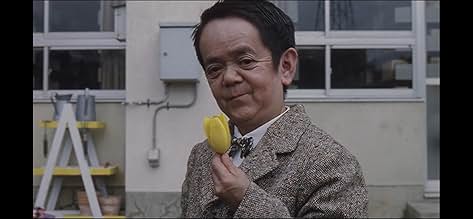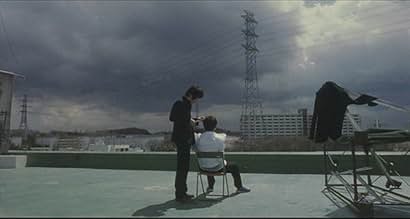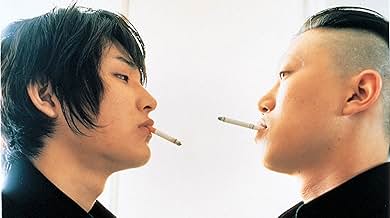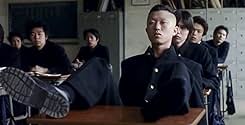CALIFICACIÓN DE IMDb
7.2/10
4.8 k
TU CALIFICACIÓN
Un grupo de estudiantes de secundaria destartalados de Tokio se enfrentan a las dificultades de crecer, separarse de sus amigos y preocuparse por su futuro, mientras viven en un entorno alta... Leer todoUn grupo de estudiantes de secundaria destartalados de Tokio se enfrentan a las dificultades de crecer, separarse de sus amigos y preocuparse por su futuro, mientras viven en un entorno altamente violento.Un grupo de estudiantes de secundaria destartalados de Tokio se enfrentan a las dificultades de crecer, separarse de sus amigos y preocuparse por su futuro, mientras viven en un entorno altamente violento.
- Dirección
- Guionistas
- Elenco
- Premios
- 1 premio ganado y 2 nominaciones en total
Yûsuke Ôshiba
- Kimura
- (as Yûsuke Ohshiba)
Eita Nagayama
- Obake (Ghost)
- (as Eita)
- Dirección
- Guionistas
- Todo el elenco y el equipo
- Producción, taquilla y más en IMDbPro
Opiniones destacadas
I'm told the title Aoi Haru can be read two ways: "blue spring" or "teenage years". Anyway, I liked this movie. What I liked were the dark aspects of this movie and the attempts at symbolism. What I didn't like was the somewhat aimlessness of the plot and the attempts at symbolism. I find it a lot like "go" which also has Hirofumi Arai (Aoki). Both violent highschool movies. Some people have compared it to Battle Royale... although I think this has a better basis in reality. Someone mentioned this movie was strung together from several short manga stories, which makes sense, since we tend to jump through several character's story lines. It isn't necessarily a bad thing, as we get to see where each character is coming from and where they end up. The variety is nice but it I felt like the movie lost it's focus at points. Overall, though, I felt it draws the viewer in and manages to stay kinetic throughout. There was rarely a boring moment. Even a girl waiting for her boyfriend ended up being very amusing. The movie is rather violent and disturbing at points, but managed to still be funny and introspective. I'd probably recommend it to people who can still remember what highschool was like.
I'm going to keep it short: I do hope this movie doesn't die out along with the jap trend as it is really worth seeing, especially if you are around (or just past the age of the protagonists) or planning to be involved in education. It's got great yet simple symbolism and a teenage-angst ridden realism that isn't try-hard. If you have experienced anything close to that kind of school envimeronment, it hits home. If you have been as privileged as not to, then it might prove to be quite eye-opening. In other words, it is food for thought, paired with a killer soundtrack, that embraces and escalates the feelings of each scene: be it angst, sadness, pressure or the very abscense of any of them.
I watched this film for the first time a few nights ago, and it was still in my mind as i took my hour's long morning walk to work.it was still not enough time to properly reflect on what i'd just watched. it really touched me deep, it effected me as much as Battle Royale. even though i couldn't get subtitles on my computer the story was easy to pick up and i didn't realise i wasn't reading them. if i could strongly recommend any film other than 'Battle Royale', 'All about Lily Chou-Chou' and 'moonlight jellyfish', it would most definitely be this one.its quite a powerful film. there's more to the story than just whats on the surface and we get to see some of our most lovable Japanese actors play totally new roles. one of which is the lovely 'Sosuke Takaoka' who plays the slightly psychotic 'Yukio', who gives 'Kazuo Kiriyama' a run for his psycho-status.even though he goes out too early he is the one who sticks strongly in my mind,he can change such a simple little tune into one that is quite haunting.all the characters add something special to the film.in my opinion its too short.i love long films and would have liked to get to know a little more of each character,especially 'Yoshimura' ('Shugo Oshinari') 'Yukio' ('Sosuke Takaoka') and 'Takashi Tsukamoto's' character.the violence is strong but none the less kept realistic and believable right up until the breath-holding end,which kind of pulls on the heart-strings but doesn't disappoint in the quality of the ending, only for the fact that we're left with feeling of sadness for 'Aoki', one of the main characters.this film ends in totally the right way to be true to the film.this film was done with pure excellence and is capable of showing beauty through the darkest of violence.many people forget what its like for young kids growing up and the situations, challenges and decisions they have to face. this film can really bring you back down with a truthful slam to the ground.this is one story that will stay firmly set in my mind for a very long time and one that should be acknowledged,all the actors really pull of this film with the highest quality.other than the above mentioned Japanese films, you really will be hard pushed to find such a powerful film to beat this one,you will not be disappointed, guaranteed. Lisa Sawyer(21)
I read a review of "Blue Spring" on a movie festival page, and thought it sounded interesting at the very least. I purchased it blindly, hoping it would live up to some of the rave reviews it received. Not only did it live up to it's billing, it replaced Takeshi Kitano's "Fireworks (Hana-bi)" as my all-time favorite movie.
From the opening scene we get the feeling that this is not your normal highschool and these are not your normal students. However, the students face problems that are extremely similar to the problems we have all had. However, we come to realize that the setting and the characters are not that different and that the story is in fact believable. This above all else is the reason why "Blue Spring" touched me so much.
The main character Kujo wins a game of "Clapping" and becames the boss of a gang at an all-boy high school. The idea of the game is to clap as many times hanging from a roof-top fence without falling to your death. At first he finds his role mildly amusing as he deals out punishment to anyone who disrespects him or his best friend Aoki. Eventually, as with everything, he grows tired of his role and begins to lose his control of the school.
Aoki is dependent on Kujo. He needs Kujo to tell him what to do, how to act. But when Kujo alienates Aoki, it sends him into a tail-spin of destruction.
The other members of the gang hit were very easy to identify with. One member devoted his entire childhood to chasing the dream of taking the baseball team to Nationals. However, when he blows their chance on the final pitch of a game, he can't get past it and is unable to move on with his life. What makes this even more difficult for us to watch is the fact that he is a tutor of sorts to a freshman student who is beginning to take the game too far and is seemingly destined to live out the same fate.
Another student has no absolutely no direction. No clue as to what he wants to do. As the time for him to decide begins to run out the pressure becomes to much for him and he commits an unbelievable act. Perhaps my favorite character in the entire film.
Other kids include many who are controlled by the whims of the leaders, some who genuinely want to get out of there and go to school and one who is cruely called "Ghost" (even by teachers) because he has a terminal illness.
The direction is simply amazing. Toshiaki Toyoda always manages to find the right angle. Some scenes are absolutely beautiful. One example is when a character waits on the rooftop after school lets out and the camera fast-forwards through the entire night and into the morning as he waits for the next day to begin. Another is when Ghost is seen running away from school, as other students contemplate his motivation. Yet another example is one student's penchant for coloring things black and there is a quick shot of him standing atop the school, which has been seemingly been painted black over night, only to have a another cut back to reality shows the school is still white leaving the viewer thinking "Did I just see that?"
Dramatic moments are intercut with shots of the beautiful cherry trees that border the school (one character takes care of them with extreme devotion), blooming flowers, clouded skylines ect. Even in moments of extreme violence or desperation we are never allowed to forget that this is a beautiful film. The soundtrack is simply one the best I've ever heard. The Japanese punk-rock fits in perfectly as it pounds our ears during slow-motion shots and equally well with chases through the school and acts of violence.
The ending of the film is unforgettable. It's one of those endings that - when the credits roll - you're just left staring and wishing it didn't end, but you know it couldn't have ended any other way. I've never given a film a 10/10 before but I whole-heartedly believe this film deserves it. It's not particularly easy to watch but it's undeniably moving and powerful.
From the opening scene we get the feeling that this is not your normal highschool and these are not your normal students. However, the students face problems that are extremely similar to the problems we have all had. However, we come to realize that the setting and the characters are not that different and that the story is in fact believable. This above all else is the reason why "Blue Spring" touched me so much.
The main character Kujo wins a game of "Clapping" and becames the boss of a gang at an all-boy high school. The idea of the game is to clap as many times hanging from a roof-top fence without falling to your death. At first he finds his role mildly amusing as he deals out punishment to anyone who disrespects him or his best friend Aoki. Eventually, as with everything, he grows tired of his role and begins to lose his control of the school.
Aoki is dependent on Kujo. He needs Kujo to tell him what to do, how to act. But when Kujo alienates Aoki, it sends him into a tail-spin of destruction.
The other members of the gang hit were very easy to identify with. One member devoted his entire childhood to chasing the dream of taking the baseball team to Nationals. However, when he blows their chance on the final pitch of a game, he can't get past it and is unable to move on with his life. What makes this even more difficult for us to watch is the fact that he is a tutor of sorts to a freshman student who is beginning to take the game too far and is seemingly destined to live out the same fate.
Another student has no absolutely no direction. No clue as to what he wants to do. As the time for him to decide begins to run out the pressure becomes to much for him and he commits an unbelievable act. Perhaps my favorite character in the entire film.
Other kids include many who are controlled by the whims of the leaders, some who genuinely want to get out of there and go to school and one who is cruely called "Ghost" (even by teachers) because he has a terminal illness.
The direction is simply amazing. Toshiaki Toyoda always manages to find the right angle. Some scenes are absolutely beautiful. One example is when a character waits on the rooftop after school lets out and the camera fast-forwards through the entire night and into the morning as he waits for the next day to begin. Another is when Ghost is seen running away from school, as other students contemplate his motivation. Yet another example is one student's penchant for coloring things black and there is a quick shot of him standing atop the school, which has been seemingly been painted black over night, only to have a another cut back to reality shows the school is still white leaving the viewer thinking "Did I just see that?"
Dramatic moments are intercut with shots of the beautiful cherry trees that border the school (one character takes care of them with extreme devotion), blooming flowers, clouded skylines ect. Even in moments of extreme violence or desperation we are never allowed to forget that this is a beautiful film. The soundtrack is simply one the best I've ever heard. The Japanese punk-rock fits in perfectly as it pounds our ears during slow-motion shots and equally well with chases through the school and acts of violence.
The ending of the film is unforgettable. It's one of those endings that - when the credits roll - you're just left staring and wishing it didn't end, but you know it couldn't have ended any other way. I've never given a film a 10/10 before but I whole-heartedly believe this film deserves it. It's not particularly easy to watch but it's undeniably moving and powerful.
I think it captured the high school feeling of despair better than any other movie. The high school movies I am used to usually transform everything into a battle between characters where in the end the good guy wins. Or maybe he loses. But what if you don't want a battle? What if you just don't know what to do or you just don't care?
In Aoi Haru a deadly game decides who the leader of the school will be. A lonely quiet guy wins the game, but he does it only because he doesn't care enough to fear for his life. He actually does it for the game, not for the leadership. That annoys the hell out of his friend, ex boss himself, who can't understand someone that does not want to abuse his power. In the end their friendship is brutally ended.
There are some interesting metaphors in there, like the flowers that the boys are trying to grow, even if just one of them lives to see them blossom. It is also interesting that it is a boys only high school, maybe that's the norm in Japan, I don't know.
There is also in the movie the hidden message that neglect and inaction can do more damage than acting badly. I am talking here about the teachers in the film, that are just dictating machines with no will to educate or care. I mean, doctors can be accused of malpraxis. Lawyers, too. Yet teachers, who are supposed to create social beings from adolescents, are not held responsible for their mistakes.
Enough babble. This is a good film, maybe a bit long, but it does need almost every scene. The soundtrack is also very nice and fits the plot. It is worth watching.
In Aoi Haru a deadly game decides who the leader of the school will be. A lonely quiet guy wins the game, but he does it only because he doesn't care enough to fear for his life. He actually does it for the game, not for the leadership. That annoys the hell out of his friend, ex boss himself, who can't understand someone that does not want to abuse his power. In the end their friendship is brutally ended.
There are some interesting metaphors in there, like the flowers that the boys are trying to grow, even if just one of them lives to see them blossom. It is also interesting that it is a boys only high school, maybe that's the norm in Japan, I don't know.
There is also in the movie the hidden message that neglect and inaction can do more damage than acting badly. I am talking here about the teachers in the film, that are just dictating machines with no will to educate or care. I mean, doctors can be accused of malpraxis. Lawyers, too. Yet teachers, who are supposed to create social beings from adolescents, are not held responsible for their mistakes.
Enough babble. This is a good film, maybe a bit long, but it does need almost every scene. The soundtrack is also very nice and fits the plot. It is worth watching.
¿Sabías que…?
- TriviaIn the scene where Kimura gives his blazer to the baseball club freshman before climbing over the fence to join the Yakuza, there is Japanese writing embroidered on the jacket lining. This is the same poem that Kimura reads out in voiceover during the subsequent shots of him getting in the car.
- ConexionesVersion of Revolver - Aoi haru (2003)
- Bandas sonorasDrop
Performed by Thee Michelle Gun Elephant
Selecciones populares
Inicia sesión para calificar y agrega a la lista de videos para obtener recomendaciones personalizadas
- How long is Blue Spring?Con tecnología de Alexa
Detalles
Taquilla
- Presupuesto
- USD 800,000 (estimado)
- Tiempo de ejecución
- 1h 23min(83 min)
- Color
- Relación de aspecto
- 1.85 : 1
Contribuir a esta página
Sugiere una edición o agrega el contenido que falta






















